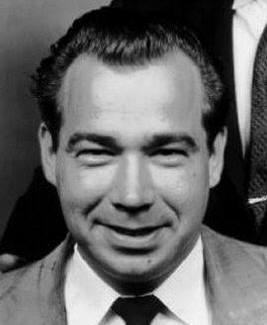
Pioneer of the Memphis soul sound, Bill Black's Combo scored six Top 20 hits from 1959-1962 and two more in the Top 30.
Bill Black

Pioneer of the Memphis soul sound, Bill Black's Combo scored six
Top 20 hits from 1959-1962 and two more in the Top 30.
Bill Black Jr. was born on September 17, 1926, in Memphis, Tennessee, to a motorman for the Memphis Street Railway Company. He was the oldest of nine children. His father played popular songs on the banjo and fiddle to entertain the family. Black learned to play music at the age of 14 on an instrument made by his father—a cigar box with a board nailed to it and strings attached. At the age of sixteen, Black was performing "honky-tonk" music on acoustic guitar in local bars.
During World War II, Black was stationed with the U.S. Army at Fort Lee in Virginia. While in the Army, he met Evelyn, who played guitar as a member of a musical family. They married in 1946 and returned to Memphis. Black worked at the Firestone plant.
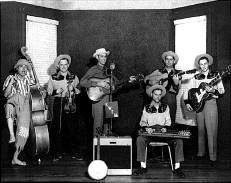
Starlite Wranglers
(L-R) Bill Black, Tommy Seals, Don Poindexter, Millard Yow, Clyde
Rush, Scotty Moore
photo courtesy Scotty Moore
He began playing the upright double bass, modeling his "slap bass" technique after one of his idols, Fred Maddox, of Maddox Brothers and Rose.Black also developed a "stage clown" persona in the same way that Maddox entertained audiences. Black performed as an exaggerated hillbilly with blacked-out teeth, straw hat and overalls. According to his son, Black said his goal was always to give his audience "a few moments of entertainment and maybe a little bit of humor that'll tickle 'em for a while."
In 1952, Black began playing in clubs and on radio shows with the guitarist Scotty Moore. Along with two other guitarists and a fiddler, they performed country music tunes by Hank Williams and Red Foley in Doug Poindexter's band, the Starlight Wranglers. Black and Moore also played in a band with Paul Burlison, Johnny Burnette, Dorsey Burnette on steel guitar, and a drummer.
In July 1954, Sam Phillips, of Sun Records, asked Black and Moore to play backup for the as-yet-unknown Elvis Presley.Black slap-played the double bass with Moore on lead guitar, while Presley played rhythm guitar and sang lead. Neither musician was overly impressed with Presley, but they agreed a studio session would be useful to explore his potential.
On July 5, 1954, the trio met at Sun studios to rehearse and record a handful of songs. Tthe first song they recorded was "I Love You Because", but after a few country music songs that weren't impressive they decided to take a break. During the break, Presley began "acting the fool" with Arthur Crudup's "That's All Right (Mama)", a blues song.When the other two musicians joined in, Phillips taped the song. The upbeat sound was original.
The next day, the group recorded four more songs, including "Blue Moon of Kentucky", by the bluegrass musician Bill Monroe, which he had written and recorded as a slow waltz. Sources credit Black with initiating the song, with Presley and Moore joining in. After an early take, Phillips can be heard on tape saying, "Fine, man. Hell, that's different—that's a pop song now, nearly 'bout."
Phillips took several acetates of the session to DJ Dewey Phillips (no relation) of Memphis radio station WHBQ's Red, Hot and Blue show. From August 18 through December 8, "Blue Moon of Kentucky" was consistently higher on the charts, and then both sides began to chart across the South.

Starlite Wranglers
L to R: Scotty Moore, Tom Sealy, Doug Poindexter, Bill Black,
Clyde Rush
Photo courtesy Scotty Moore
Black and Moore became Presley's backup group and were paid 25% of his earnings. Moore and Black left the Starlite Wranglers after the success of "That's All Right", jealousy within the group forcing them to split. Their recordings at Sun were released with the credits as "Elvis Presley, Scotty and Bill." The group was later billed as "Elvis Presley and the Blue Moon Boys."
Over the next 15 months, the trio released five singles, toured across the South, and appeared regularly on the Louisiana Hayride. They had auditioned for the Grand Ole Opry in October 1954, but they failed to impress the people in charge, or the audience, and were not invited back.
In 1955, Black went to RCA Victor along with Presley and Moore when Presley's contract was sold to that company. Except for the RCA reissue of "Mystery Train" and "I Forgot to Remember to Forget" ("with Scotty and Bill"), they were no longer credited on record labels.
Black played on early Presley recordings including "Good Rockin' Tonight", "Heartbreak Hotel", "Baby Let's Play House", "Mystery Train", "That's All Right", and "Hound Dog". .
Black, Moore and the drummer D. J. Fontana toured extensively during Presley's early career. Black continued his onstage "clown" persona and developed comedy routines with Presley.

Bill Black Combo circa 1960
L to R: Bill Black, Carl McEnvoy, Ace Cannon, Chips Moman
and Jerry Arnold
Photo courtesy Colin Escort
In 1959, Black joined a group of musicians which became Bill Black's Combo. The lineup was Black (bass), Joe Lewis Hall (piano), Reggie Young (guitar), Martin Willis (saxophone), and Jerry Arnold (drums). There were several personnel changes. While Young was in the army, his position was filled by Hank Hankins, Chips Moman and Tommy Cogbill. On sax, Ace Cannon took over touring duties from Willis who remained in Memphis for the studio work and movie appearances. Carl McVoy replaced Hall in the studio, while Bobby Emmons replaced him on tour.

The band released blues instrumental "Smokie" for Hi Records in December 1959. "Smokie, Part 2" became a No. 17 U.S. pop hit, and made number one on the "black" music charts. It sold over one million copies, and was awarded a gold disc by the RIAA. A follow-up release, "White Silver Sands" was a Top 10 hit (No. 9) and, like its predecessor, topped the R&B chart for four weeks.
Eight of the recordings by Bill Black's Combo placed in the Top 40 between 1959 and 1962.
The Combo appeared in the 1961 film Teenage Millionaire and on The Ed Sullivan Show, where they performed a medley of "Don't Be Cruel", "Cherry Pink", and "Hearts of Stone", and were voted Billboard's number one instrumental group of 1961.
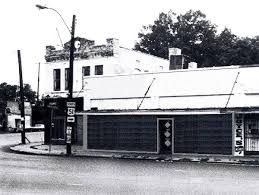
Lyn-Lou Studio 1518 Chelsea Street
In 1962, Bill Black opened a recording studio called "Lyn-Lou Studios" (a shortened nickname "Linda-Lou" he had for his daughter Nancy), and a record label named "Louis" after his son,on Chelsea Street in Memphis, Tennessee, with Larry Rogers as his engineer and producer. Johnny Black, Bill's brother and also upright bass player, who knew Elvis at Lauderdale Courts before Bill.
Early in 1963, Black sent from two to five different versions of the Combo to different regions of the country at the same time, while staying off the road himself, wanting to concentrate on his business, family and his health.
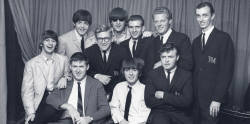
Black himself had been ill for the past year and a half and unable to travel. Nonetheless, he insisted that the band continue without him. Bill Black's Combo created musical history in 1964 when they became the opening act for the Beatles their 13-city tour of America after their appearance on The Ed Sullivan Show. Black himself was not well enough to make the tour.
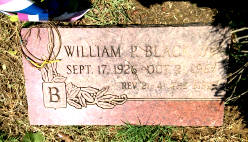
After two surgeries and lengthy hospital stays, Black died of a brain tumor on October 21, 1965, at age 39. Black's body was buried next to his father, William Patton Black Sr., at Forest Hill Cemetery in Memphis.
Bill Black was inducted into the Rock and Roll Hall of Fame in 2009